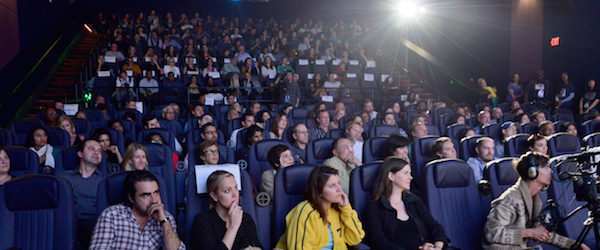Blurry Brains And Spirited Discussions—The Trials And Tribulations Of Programming The LA Film Fest

This year the Los Angeles Film Festival has redoubled its efforts to showcase unique voices that will shape the future of film. “Our curatorial focus this year was to create a program of vibrant and diverse stories and storytellers who exhibit true and singular voices,” said Associate Director of Programming Roya Rastegar.
To accomplish that goal, Rastegar and her staff assembled a team of programmers whose job it was to cull through the thousands of submissions, sacrificing their sleep, social lives and sometimes even their sanity. Programmers watched an average of 4 films per day on weekdays and as many as 10-12 per day on weekends.
“Any more than that and my brain can go blurry, which isn’t fair to the filmmaker,” said Programmer Drea Clark. “My eyeballs hated me but my cats loved it. I’m their favorite mattress.”
“The process was intense and emotionally exhausting,” added Associate Programmer Steven Jacobson, “But I’d do it again in a heartbeat.”
We talked with Jacobson, Clark and five other members of the LAFF programming team—Samuel Douek, Lee Jameson, Mark Maynard, Lucy Mukerjee-Brown and So Yun Um—about the exhausting but gratifying process of programming a film festival.
Did fights break out in your meetings over which films were going in? How did you handle those disagreements?
Samuel: I’m not sure fights would be the right word…
Lee: There were definitely heated debates.
Steven: I would call them spirited discussions. Hearing that one or more of the other programmers hasn’t warmed to a film you love dearly is always a little painful, but luckily we’re all thick-skinned.
Lucy: What Roya made clear is that those films that polarized the team were the ones that she was most interested in. If any films provoked a lively debate, the feeling was that there was probably something special there. When there was a film that divided us down the middle, Roya would step in and be the tie-breaking vote.
What is the hardest part of the job? What is the most rewarding part of the job?
So: The hardest part of the job is trying to consume so much, all while maintaining a clear head and finding that unique voice in the huge numbers of submissions coming in.
Steven: Copious amounts of coffee helped somewhat. At times I would begin to watch a film and then realize I wasn’t taking it in—that’s when I would always stop and try again after I was rested. I wanted to give every film its due.
Mark: We each had assigned movies to watch. But then we would get recommendations from other programmers who wanted second opinions on movies they’d viewed. So it was a challenge to keep up.
Lucy: Every film submitted is watched by multiple screeners who give it a score out of 5. The hardest part of the job is deciding the fate of the thousands of films that got 3s. If we do decide to reluctantly pass, we might flag that filmmaker as someone we want to encourage to submit their next project. If you get a personal email from a programmer, take it seriously! The most rewarding part of the job—hands down—is championing filmmakers and being able to put the spotlight on them and their stories.
Drea: When you are super excited to share something with the team, and then a number of people share your excitement, that’s awesome. Watching that film make it all the way through and then seeing those filmmakers at their premiere is amazing. You feel like you were secretly a part of their team and it makes all the long, solo hours watching things in the dark worth it.
What do people think film programming is? What is it really?
So: People think film programming is getting to watch all these great films for free before everyone else, which is what I thought film programming was before I did it. But it’s really intense work.
Lee: We’re tracking films, researching premiere status, luring filmmakers, negotiating with distributors, gathering deliverables, scheduling and slotting, writing and proofreading tons of copy, and much, much more.
Lucy: I’m sure people think it’s all about, “who you know” and that having an “in” with a programmer means that your film will automatically get selected. But that’s not true. At the Los Angeles Film Festival, every film is evaluated on its own merit. Also, programmers don’t enjoy saying no. We’re not mean, frustrated filmmakers. We are united by the collective goal of wanting to support directors and help you get an audience for your film, so you can get distribution and go and make the next one.
Steven: The most common misconception may be that programming a festival entails picking the “best” films submitted. That implies film programming is a “judging” process, and I don’t really think it is. The work of each individual programmer is finding films that ignite something within us and that we are passionate about on a very personal level. Also, the fact that Los Angeles is the movie capital of the world pushes us, I believe, to really stretch the boundaries of what film is and what it’s capable of doing as an art form. Movies can be challenging, troubling, entertaining, awe-inspiring, heartbreaking, and hilarious, and we tried hard to put together a program that captured all of that potential, and then some!
You’re looking for unique voices that will define the future of film. So you pop in a DVD of a film you know nothing about by a filmmaker you’ve never heard of. What’s usually the first clue that it might meet your criteria? What’s one thing that immediately marks it as a film you won’t program.
Lucy: The first shot is crucial. That’s what gets the viewer’s attention and determines whether or not they engage. For me, a character I can identify with or root for is likely to elicit a positive response.
Drea: This is tricky, because the minute you identify something as being on your no-go list, you’ll see a film that does that exact thing and is totally brilliant. I’m most encouraged when I start a film and immediately get a strong sense of a distinctive place and tone. It tells me I’m in the hands of a director that is thinking beyond a general checklist of “establishing shot, reaction shot, insert.”
Lee: If I think to myself, “Whoa, I’ve never seen something quite like this before,” then usually the film is worth considering and I might pass it along for a second opinion. On the other hand, if I’m halfway through a film and I couldn’t care less what happens to the characters, that’s a red flag that something isn’t working.
Mark: For me personally, the story has to be well told. I’m looking for actors who can relay that story to me, people who can engage me enough to bring me into their world. The major turnoffs for me are bad production value and bad acting.
Steven: I simply want to feel something. When you’re watching so many films in a day, the ones that tend to stand out stir something in you that won’t fade away.
Programmer Picks
We asked each of the programmers to pick three of their personal favorites playing in this year’s festival and tell us what stood out about them. Here are their answers.

Drea
The Girl in the Book (US Fiction Competition)
I loved that the female at the heart of this story felt so real and so screwed up—not in a campy hijinks way, but with a true sense of falling apart before she could pull herself back together. For good or for bad, she is calling the shots of her future while carrying the damage of her past. It’s beautiful to see that revealed with such messy vibrance.
Dude Bro Party Massacre III (Nightfall)
Hilarious and ridiculous. Full of 80s callbacks, buckets of blood, and a bag of oranges that makes no sense, but also makes all the sense. This is the kind of movie that lets you feel like you’re in on the joke from the very beginning, and that sense of fraternity never wavers. Yep. FRATERNITY. The pun stays; DBPM3 would want nothing less.
Band of Robbers (Zeitgeist)
There’s something so cool about a film that lays down a premise as ambitious as “a modern re-imagining of Tom Sawyer & Huckleberry Finn,” hits those expectations in all the smarty ways, then surpasses them by throwing in a great sense of style and charming, weirdo camaraderie.

So
Out of My Hand (US Fiction Competition)
Takeshi Fukunaga tells the immigrant story with a fresh perspective of a struggling Liberian rubber plantation worker who risks everything to discover a new life as a Yellow Cab driver in New York City. Accompanied by stunning cinematography, Out of My Hand is a poignant and universally resonant story about the so-called “American Dream.”
Victoria (Buzz)
Sebastian Schipper’s one-take action thriller follows a runaway party girl who gets mixed up with the wrong men when their night of partying quickly turns into a bank heist. Immersive and viscerally powerful, Victoria is the only one-shot action heist film you need to see!
Flocking (World Fiction Competition)
When a 14-year-old girl reports that she has been sexually assaulted by her well-liked classmate, her small town turns against her and her family, and a mob mentality takes over. Beata Gardeler’s sophomore feature is an understated piece that comments on the grim realities of victim blaming without over-dramatizing events. It’ll keep you guessing until the very end.

Lee
The Overnight (Buzz)
A young couple, new to Los Angeles, is invited to the home of their young son’s friend for a family play date. The evening grows increasingly bizarre for everyone involved, to say the very least. Starring Adam Scott, Taylor Schilling, Jason Schwartzman, and Judith Godrèche, The Overnight is a raucous comedy that manages to develop memorable characters and evoke complex themes while inducing gut-busting laughter.
Crush the Skull (Nightfall)
When two expert burglars wind up trapped in the house they intended to rob, they soon discover they’ve accidentally wandered into the lair of a sadistic serial killer. Crush the Skull perfect blends humor, horror, and fast-paced fun and will leave genre fans wanting even more.
Flock of Dudes (LA Muse)
A man-child living a wild, party lifestyle with his lifelong friends decides to break up with them and finally grow up. With a cast that features Chris D’Elia, Brett Gelman, Eric André, Hannah Simone, Hilary Duff, Marc Maron, Kumail Nanjiani, Hannibal Buress, and more, this one is a must-see for alt-comedy buffs.

Lucy
How He Fell In Love (US Fiction Competition)
This expertly crafted film took us all by surprise. The instinctive attraction between the two leads feels so authentic that you find yourself surrendering to it and getting swept away by their affair. Their relationship is a complicated one, which makes it feel all the more real. A special gem, not to be missed!
Shut In (Nightfall)
What happens when robbers break into your house but you’re too afraid to leave? This unique take on the home invasion movie, featuring an agoraphobic lead character, is a highlight of our Nightfall section. A provocative and intense journey of twists and turns.
Love Between the Covers (Documentary Competition)
This documentary woke me up to the fact that women are a force to be reckoned with in the publishing world. Despite women’s fiction being marginalized by critics and so-called intellectuals, female authors are steadily selling billions of books a year. This is a fascinating and rare look inside a world we know little about.

Steven
What Lola Wants (Zeitgeist)
This is a neo-Bonnie and Clyde romp that I became enamored with before the opening title sequence was done. The craft is tremendous, but there’s also a passion for moviemaking that suffuses every frame. The two young leads are chemistry personified, and their tension-filled love story is uniquely cinematic. There’s also a dreamily surreal quality to the dialogue, which is unexpected and unforgettable.
A Midsummer’s Fantasia (World Fiction Competition)
Summarizing the dual narrative of this film (a Korean director visits a small Japanese village to research his new film; a Korean actress explores the same area with a local persimmon farmer) is almost pointless, because the joys of this work are far too subtle to be captured in a synopsis. It’s a love story at heart, but one so delicate and thoughtful that it almost redefines the genre. I urge filmgoers to be patient with this one—the rewards are substantial.
My Love, Don’t Cross that River (Documentary Competition)
Within minutes, I fell head-over-heels in love with this South Korean documentary—and so did the whole programming team. I’ve never seen such a unanimous swoon! A perfect film (yes, it seems one exists) covering the final years of a 76-year marriage. At turns heartwarming and heartbreaking, visually beautiful, and even hilarious, it’s an unmissable gem.

Samuel
Be Here Now (The Andy Whitfield Story) (Documentary Competition)
This film will make you believe in the human spirit in a great way. It’s touching and personal like very few stories out there.
Elvira, I’d Give You My Life But I’m Using It (World Fiction Competition)
Laugh-out-loud humor, Mexican style! Manolo Caro is a talent to keep an eye on.
Crumbs (Nightfall)
Innovative filmmaking at its best. I couldn’t begin to capture this film in a two-line description. Just watch it.

Mark
3rd Street Blackout (US Fiction Competition)
From the first moments of the film, I knew I was going to like this movie. Although I live in Los Angeles, I’m a sucker for a good New York story. I’m also a sucker for a quirky indie love story, and this movie spoke to all the early independent film vibes that have shaped my taste to date.
Ayanda and the Mechanic (World Fiction Competition)
Another story that commanded my attention from the first few frames because of its bright, funky African style. With the introduction of each character, I was reminded how I’ve let the news warp my view of Africa. The film shows a hip, cosmopolitan mecca that I can’t recall seeing in a feature film. There were moments when I had to remind myself that the story wasn’t set in Brooklyn.
Puerto Ricans In Paris (US Fiction Competition)
The title says it all, really. When I saw Luis Guzman, Rosie Perez, Rosario Dawson and Edgar Garcia, a big smile just ran across my face and stayed there for the entire film. It’s a fun movie. It’s not deep or overly dramatic or made on a shoe string budget with a heavy message, but it’s funny. It speaks to core emotions and I thoroughly enjoyed it.
Tom Sveen / Film Independent Blogger